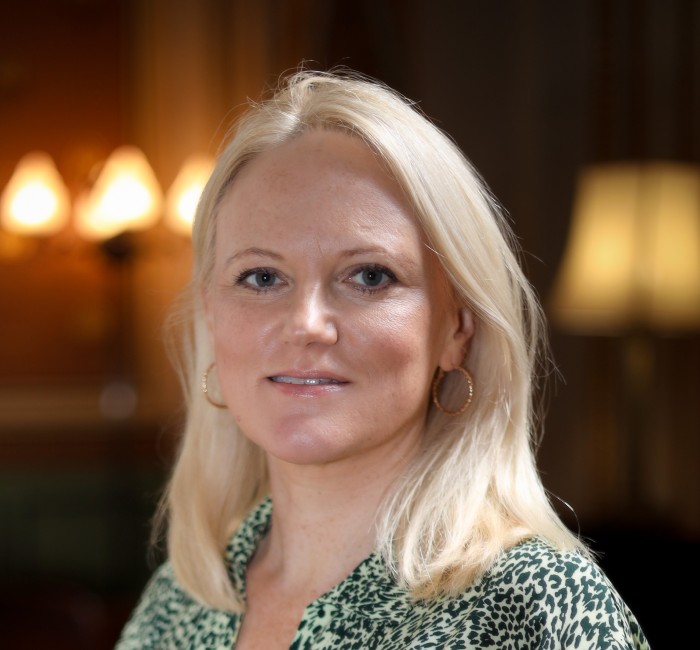Helen Hookway Election Statement

Tell us about your professional skills and experience
I bring a wealth of global experience in the interior design industry, having worked across six continents and led complex, high-profile projects from the UK. My background spans high-end residential design—including work with a respected New York-based practice delivering homes across the US and Caribbean—as well as commercial interiors such as private members’ clubs and large-scale office developments.
Currently, I serve as Head of Design for FCDO Services, where I lead multidisciplinary teams to deliver interior environments for the UK’s diplomatic estate worldwide. These spaces are not only functional workplaces but also vital platforms for British soft power. I balance duty of care with representational impact, ensuring our designs reflect both purpose and national identity.
A core part of my role involves working closely with UK-based SMEs to design and manufacture bespoke furnishings for embassies and official residences, promoting British craftsmanship on a global stage. I provide strategic design leadership, mentor junior team members, and foster a culture of professionalism and technical excellence. I’m equally focused on the practical aspects of delivery—ensuring projects are completed on time, within budget, and to a high standard.
As part of the senior leadership team, I contribute to corporate strategy, resource planning, and financial oversight. I also maintain hands-on involvement through project delivery and peer review, keeping my skills current in areas such as stakeholder engagement, supplier management, and logistical coordination. This balance of creative leadership and operational rigour defines my approach to design.
Why are you standing for election to the BIID Council and what do you think you will bring to the role of the director?
I am standing for election to the BIID Council to contribute meaningfully to the advancement of our profession and to support fellow designers in navigating an evolving, globalised industry. With extensive international experience, I bring a broad perspective on design practice, cultural context, and client expectations . This global insight has shaped my approach to design and deepened my understanding of the challenges and opportunities facing our profession. In addition, I have a strong grounding in government regulations and compliance. I believe this knowledge is increasingly important as designers are called upon to meet higher standards in sustainability and health and safety. I am passionate about helping members understand and navigate regulatory frameworks and about ensuring that the BIID continues to influence policy on behalf of our profession. As a Director, I would bring a collaborative mindset, strategic thinking, and a commitment to excellence in both design and professional practice. I'm interested in supporting initiatives related to education, advocacy, and mentoring, as well as fostering stronger global connections for our members. I believe the BIID plays a vital role in raising the profile of interior design and ensuring our voices are heard at every level—from industry to government. I would be honoured to contribute to this mission and help guide the Institute’s work during this important time for the profession.
What activity or initiative outlined in the 2024-2027 BIID Strategic Plan would you like to focus on if you are elected?
If elected, I would like to focus on the BIID’s commitment to promoting sustainable, ethical, and inclusive design, particularly the goal of equipping members with resources and training around inclusive design and sustainable specification. Working internationally across six continents—and now designing for the UK diplomatic estate—I’ve seen firsthand how inclusivity, sustainability, and cultural sensitivity are not only essential to good design, but to the broader impact our work can have on people and environments. Designing for embassies and official residences means ensuring spaces are accessible, safe, and representative—while also reflecting British values and meeting rigorous government standards. I’m especially interested in supporting the Institute’s efforts to regularly update the Sustainable Specifying Guide and to expand training on inclusive design practices, including regulatory guidance and practical tools. With my experience in government compliance and stakeholder engagement, I can contribute a pragmatic, real-world perspective to help make these resources even more relevant and actionable for members. I believe design must lead the way in ethical responsibility, and the BIID’s focus in this area is both timely and necessary. I’d be proud to help drive these initiatives forward, supporting members in integrating sustainability and inclusivity into every stage of their projects.
What do you see as the long-term strategic priorities of the BIID?
I see the long-term strategic priorities of the BIID as centred around three key pillars: strengthening professional recognition, leading on sustainability and inclusion, and broadening the Institute’s influence both nationally and internationally.